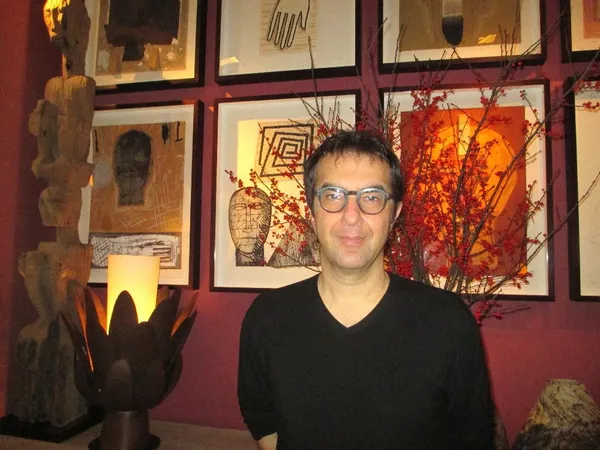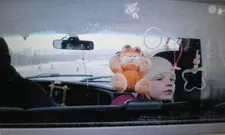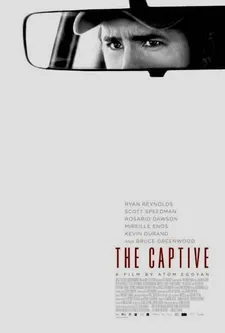 |
| Director Atom Egoyan on The Captive in New York: "This is the most challenging and something I've explored in The Sweet Hereafter and Exotica…" Photo: Anne-Katrin Titze |
We speak about Wolfgang Staudte's Murderers Are Among Us, the blurring of parameters, Bruce Greenwood's Vince at the charity ball, the upcoming Remember with Christopher Plummer, Martin Landau, Bruno Ganz and Dean Norris and Die Walküre.
Ryan Reynolds and Mireille Enos give fervent performances of grief as Matthew and Tina, whose daughter Cass, played as an ice-skating, pie-loving, energetic young girl by Peyton Kennedy, goes missing. For eight years, aided by a Niagara team of detectives, headed by Rosario Dawson's Nicole Dunlop and Scott Speedman's Jeffrey Cornwall, they search for the missing child. The viewer knows her whereabouts in the clutches of Kevin Durand's Mika, a man in their midst, who comes up with new bristling storytelling functions for Cass (now played by Alexia Fast) as she grows older in The Captive.
 |
| Peyton Kennedy as Cass: "There is this collision in the film between a world which is heightened and theatrical and something which is more naturalistic." |
Researching the story, the rules of undercover operations, and how reality is altered once you discover the existing gates of Hell, are revealed.
Anne-Katrin Titze: Did the idea of The Captive grow out of a specific case?
Atom Egoyan: There were two cases. There was a case in the town I was raised in on the west coast of Canada where a boy had gone missing. His parents took him to a park one day, turned their backs for a moment and he was gone. He has never been recovered. It's been over 20 years and every time I go back, I see age-enhanced images of him and the parents still waiting. And the other was the story of a paedophile ring that was discovered in Ontario.
17 victims came forward in the town of Cornwall, which is why one of the detectives is called Cornwall. They were claiming that they were part of a child abuse ring orchestrated by all the town's most powerful lawyers, priests and teachers. There was a public inquiry, over 50 million dollars to launch this inquiry trying to investigate whether or not the ring actually occurred. At the end, they didn't ascertain. They couldn't say if there was or wasn't a ring. The ambiguity and the horror of these lives! This one detective was outraged and publicly said, "there was this ring, how can we not indict these people?" He was completely ostracised by his cohorts.
 |
| Ryan Reynolds as Matthew with Mireille Enos as Tina: "Where people leading normal lives suddenly are forced into that heightened place where they are having to negotiate their own sanity." |
AKT: This is exactly how it works - the change of reality.
AE: The change of reality! That's what I'm trying to deal with in this film. I realised it's challenging. There's this shift of reality once you enter into this world where such things are possible. It profoundly shifts your sense of reality. We operate on this idea that there are certain fundamental principles that we respect, especially in regards to how children are treated and protected. Once that's actually debased, I think, a whole other reality comes into play. It's a horrifying place. It's a collision between those two.
AKT: You show that in the scene of the chilling, chilling charity ball. Bruce Greenwood, whom I talked to in connection to Flight and who is always extraordinary, gives his character [Vince] in The Captive the demeanor of someone you wouldn't expect to be sitting at the same table with this paedophile.
AE: Borders are sort of blurred.
AKT: The first film made in Germany after the war was Wolfgang Staudte's Murderers Are Among Us [Die Mörder Sind Unter Uns]. I was thinking of that during this scene. That was the sense that remained after the movie ended. These people are among us, doing the unthinkable.
 Nicole (Rosario Dawson)_225.webp) |
| Mika (Kevin Durand) Nicole (Rosario Dawson): "At this gala function for charity, how many people are actually involved in this?" |
AE: They are everywhere. And what I wanted to create in the film was that confusion, that blurring of where parameters normally are held. That we are actually implicated in trying to imagine how extensive this might be. At this gala function for charity, how many people are actually involved in this? How many people are watching this detective [Dunlop] and actually relish in the fact that this person who represents the fight is amongst them?
This is the most challenging and something I've explored in The Sweet Hereafter and Exotica and in this movie. This idea where, as you said, these realities collide. Where people leading normal lives suddenly are forced into that heightened place where they are having to negotiate their own sanity.
AKT: Changes in perspective, I believe, do happen in drastic shifts like that. Tell me about the choice of the name Cassandra for the abducted girl. Cassandra in Greek mythology is the seer, the prophetess who sees the future but nobody believes her. I was a bit confused by that choice.
AE: It was also the idea of someone who speaks in riddles. What she is saying is cryptic. What she is communicating to the father is something that needs to be decoded. And actually he does see that future. She is projecting that future and her liberation with that clue in black and white.
AKT: I couldn't follow all the puzzle points and I wasn't sure if I was supposed to or if this was another destabilising element.
AE: As a filmmaker you need to have a plan in mind. The meeting with the father [Ryan Reynolds as Matthew] that Cassandra [Alexia Fast] constructed, even though she knows it's carefully observed, she has to communicate to him some piece of information that no one else would understand but that would refer to a private mythology that they have and that might lead to her own salvation. But I'm interested in that, that you weren't sure in the meeting with the father why she was saying those things?
 |
| Ryan Reynolds as Matthew: "What she is communicating to the father is something that needs to be decoded." |
AKT: Yes. I was aware that she was hinting at a shared past but it was almost as though she were trying to say to him "I am your daughter, I am actually your child."
AE: So when he appears at the rink?
AKT: I thought I missed something. Why is the woman going there?
AE: That's interesting. She is actually connecting Mika [Kevin Durand] with her father. That's very telling, because you are a very careful observer. It's interesting, when I look back at The Sweet Hereafter, so many people actually had a completely different explanation over why Sarah Polley [Nicole Burnell] did what she did than what I intended. Somehow that had its own logic. I suppose that's part of the game.
AKT: Even the ending, though I was completely wrapped up in the chase scene, which usually I'm not, left me with questions. Of course, there is also the point you make about monitors.
_a19mYhw_225.webp) |
| Detective Dunlop with Matthew and Tina: "It is set up as an investigation and the viewer is provided with these pieces of evidence." |
AE: I think everyone understands that we live in a culture of Big Brother, but what I'm trying to understand with this film is that there's also Little Brother and Step-Brother, given the ubiquity of cameras in our lives. The manipulation and how people can use that becomes more specific. Cassandra thinks that this channel was opened up for her so that she can watch her mother, and Mika is able to use that and play it against her. She can't have any idea that she provides a voice-over for those images and that her mother is being tortured by these objects.
AKT: A few other moments struck me. The cross-eyed child the detectives manufacture as a lure. The details that make it alive.
AE: Doing research with these departments and teams, I was struck, probably because it's such a terribly dark world, there's that odd humor that they have about what they do. It's almost a survival mechanism. The way they bait, it's the only thing they are allowed to do, is to actually use people from within their own team. They are not allowed to use children, or images of children. In other undercover operations, detectives can use drugs or have contraband monies. In this type of investigation they are completely limited. So the obsession with how someone should look and the manicuring of that felt right.
_225.webp) |
| Detective Nicole Dunlop (Rosario Dawson): "The way they bait... is to actually use people from within their own team." |
AKT: It felt very real when the team comes to interrupt the interview. One of them looks at a puzzle and knows what it is without putting together the pieces.
AE: That is the film, really. It is set up as an investigation and the viewer is provided with these pieces of evidence. Not only evidence in terms of these fractured time lines and scenes but also various motivations and possible reasons. As he says, sometimes it's a guess, sometimes it's just wild intuition. When we were talking before about Cassandra and the clue she gives, it can be very clear to me as we're working on this. And you were aware that something was happening. There is a lot of room for conjecture, which I really invite the viewer to do.
AKT: What's coming next for you?
AE: I'll start rehearsals next week on an opera, Die Walküre. Speaking of mythology! And I am working on a new film called Remember that will be released next year. It's about a Holocaust survivor who suffers from early stages of dementia and thinks he has found the person who is responsible for killing his family. He goes on a mission to hunt this person but keeps forgetting why. It's sort of a study of memory and trauma and history.
AKT: A few weeks ago I moderated a discussion on the Glen Campbell: I'll Be Me documentary about his struggle with Alzheimer's, then there is Richard Glatzer and Wash Westmoreland's Still Alice, starring Julianne Moore. Memory loss seems to be in the air. Who are your actors?
AE: Christopher Plummer is playing the lead. Martin Landau, Bruno Ganz, Dean Norris.
 |
| The Captive poster |
AKT: What is Bruno Ganz's role?
AE: He is playing one of the people who the character thinks might have been responsible. There's a number of German actors, Heinz Lieven and Jürgen Prochnow.
AKT: Where are you shooting?
AE: All over North America. He goes on this extraordinary kind of road trip.
AKT: It sounds fascinating. Thank you very much.
AE: Please give my warmest regards to Alessandro.
AKT: I will. Every few months we do what we call The Nivola Files at Eye for Film to catch up.
In part 1, a house straight out of Alfred Hitchcock's North By Northwest turns out to be Marquis de Sade's chateau with Mozart's Magic Flute filling the icy air in The Captive, the link to The Sweet Hereafter and fairy tales.
The Captive opened in the US on December 12.
Die Walküre directed by Atom Egoyan at the Canadian Opera Company will be performed from January 31 - February 22, 2015.





















